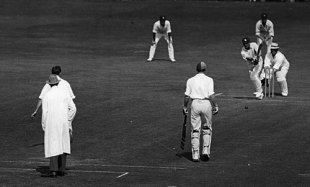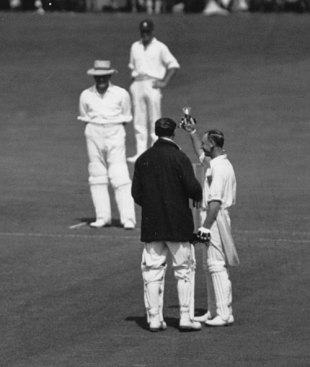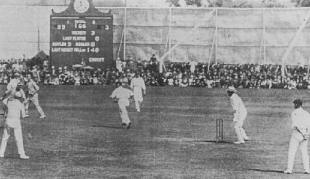
|

Jack Hobbs pushes the single that equalled WG Grace's record of 125 hundreds
© Getty Images
|
|
As Mark Ramprakash hovers on 99 first-class hundreds, every Championship match he plays in is watched by more than usual contingent of reporters and photographers, all there to record his century of centuries. We tend to think of saturation media coverage as a relatively modern phenomena, but the first real instance of it came as long ago as 1925.
That summer Jack Hobbs, who was by then 42, was in outstanding form. He started the season on 113 hundreds, and by mid July he had scored another 12, leaving him one behind WG Grace's career record of 125. His 124th hundred, against Kent at Blackheath, triggered a sudden explosion of interest, and dozens of reporters were dispatched by national and regional newspapers to the next match at Hove, along with news-reel cameras, to be what many assumed was an almost inevitable equalling of the record. "England is waiting," wrote the editorial in The Times, "with an almost expectant hush."
But Hobbs, utterly dependable, appeared to be affected by the pressure, accentuated by a large midweek crowd, missing a straight delivery in the third over for 1. Surrey won by an innings so there was no second chance.
"I am feeling very restless," he told The Guardian. "I am being weighed in the balance and I am afraid lest I be found wanting."
In the following matches, as the newspapers and cameras trudged across the country in frustration, Hobbs found, for one of the few times in his life, batting was far from straightforward. Against Kent at The Oval he made 22, at Gloucester 52 and 38, and then in three games back at The Oval, 54 and 1 against Nottinghamshire, 49 and 4 against Middlesex and 31* against Leicestershire. By mortals' standards, it was decent enough - 252 at 31.50 - but with each comparative failure, the pressure grew. When he fell for a fifty against Nottinghamshire's strong attack, the Evening News headline was "Hobbs Fails Again".

|

Hobbs toasts the crowd ... with ginger ale
© Getty Images
|
|
The entourage - players and media - headed to Somerset on the late train, and by the start of Surrey's next match on the Saturday, Taunton was packed to the rafters. There was general disappointment when Jack White, Somerset's stand-in captain, won the toss and batted. But they were bowled out for 167 shortly before tea, and by the close Hobbs, who had survived an early scare when clipping airily into the leg side early on, had 91 not out.
The tension and anticipation on the Sunday - the rest day - was considerable. Hobbs, staying at the hotel next to the station, only ventured out to go to church, but that night as he dined he watched out of the window even more pressmen arrive on the late train.
The next morning the start was delayed by 25 minutes to allow everyone to get into the ground - the queue was estimated at being half a mile long. The Somerset captain asked if Hobbs minded waiting and, typically, he readily agreed.
When play did start he pushed three singles and then caressed a four through the covers off a no-ball. Another single followed and then, to roars of acclaim, 12 minutes into the day at 11.37am, he turned Jim Bridges into the leg side and trotted the single to bring up his record-equalling 125th hundred.
The Somerset players took it in turns to shake Hobbs' hand and then Percy Fender, Surrey's captain, strode to the middle with a glass of what was assumed to be champagne. Hobbs' however, was teetotal, and the drink was nothing more than ginger ale. When the fuss died down, Hobbs added one before falling for 101.
The media had their story and they flocked back to London as eagerly as they had followed Hobbs round for the previous month. But the following afternoon, Surrey were set 183 to win, and Hobbs, freed of the burden, was back to his carefree best. He drove the first ball of the innings for four and in two hours and 20 minutes completed his second hundred of the match, passing Grace's record. It was also his 14th of the summer, beating the previous record of 13.

|

Hobbs breaks the record the following day
© Martin Williamson
|
|
It was, however, not chanceless. He was caught off a no-ball in the first over, and on 97 he danced down the pitch, missed the ball but Mervyn Hill failed - or chose not to - complete the stumping. What's more, his long-standing opening partner Andy Sandham slowed down towards the end of the match to allow him time to reach the milestone. "He played a wonderfully unselfish innings and nursed me with skill," Hobbs said.
A decent crowd surrounded the pavilion at the close and demanded a speech. "I am very happy to have achieved a lifelong ambition," Hobbs told them, adding diplomatically: "I would dearly have liked making these two hundreds at The Oval, but next to that there is no county I would have preferred to score them against but Somerset."
The one problem was that the press had flown. One young local reporter, Morley Richards, was present and he sold the story to almost all the national newspapers. John Arlott recalled that Morley and his wife enjoyed a two-week holiday in Torquay on the proceeds.
Surrey awarded Hobbs a benefit in 1926 and offers of product endorsements flooded in. He was even given the chance to act as the lead in a silent film.
Hobbs finished the summer with 3024 runs at 70.32, with 16 hundreds. He went on to pass 1000 runs in the next eight seasons, by which time he was 50, and to score another 51 centuries.
Is there an incident from the past you would like to know more about? Email us with your comments and suggestions.
Bibliography
Jack Hobbs - John Arlott (John Murray, 1981)
Wisden Cricketers' Almanack (1926)
Wisden Cricket Monthly - Various
The Cricketer - Various
Martin Williamson is managing editor of Cricinfo


